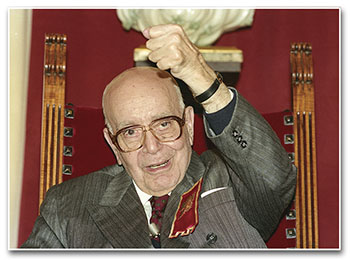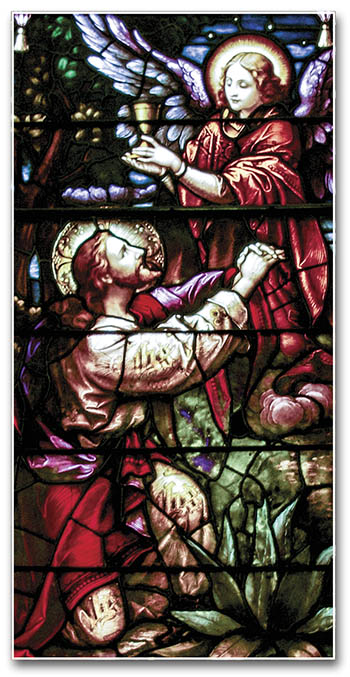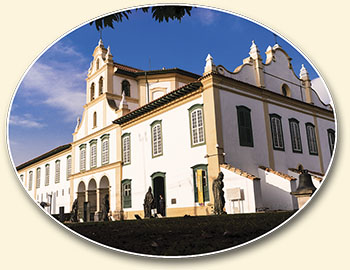My interlocutor mentioned the heroism of the crusaders, the religious, the martyrs and a series of other forms of heroism. What is common among all of them? Between the heroism of the martyrs and that of the crusaders, for example? These could almost be called opposite heroisms, for that of the crusaders consists in fighting and struggling; that of the martyrs, in withdrawing and waiting for death. Some advance towards it, others do not; but none retreat!
And what do these have in common with the heroism of the religious?
Many of us have seen pictures depicting scenes of daily life in a convent or abbey. Sometimes it is a superior giving commands to a subordinate, who receives them reverently, ready to carry them out. Sometimes it is two monks, one kneeling and the other standing, giving a directive, consoling that soul or admonishing him. In either case, the subordinate kisses the superior’s habit as a sign of acceptance of the order, the directive or the admonition: it is the complete sacrifice of the soul to God. His whole life is marked by obedience. When someone is ordered to do something, it is usually because the task would not be to his liking. Otherwise, a command would be unnecessary, since no one raises objections to doing what pleases him. So, to live by obedience, as religious do, is to live doing what one does not like.
What is the common element in these different forms of heroism, in such a way that, if we analyse it, we will identify what heroism itself consists of?
The habit of performing arduous tasks
Everyone encounters things in life that are difficult to do, which must be repeated frequently and with great effort. Because they are arduous, they cause reluctance and even a true horror. However, they are done. And often not just for the mere fulfilment of duty, but because one has deeply resolved to get into the habit of always doing them, so that one ends up having joy and satisfaction in the pleasure of overcoming and dominating oneself, doing them! This is one of the elements of heroism.
Consider, for example, young students. Not everyone welcomes the need to study. However, knowing that it is imperative, a young man can acquire the habit of studying, and in such a way that it becomes second nature to him. Deep down he will still not like it, but as it is his duty, he will do it, and this produces a kind of refreshment of soul, a breeze of clear conscience, of the glory of duty fulfilled, a feeling of honesty, which brings him a deep sense of well-being. Moreover, in some way he feels a light coming from God which covers him and gives him the reward, already on this earth, for his good deeds.
The more difficult an obligation is, the more heroism will consist in getting into the habit of doing it, transforming it into second nature. Then complete renunciation and total dedication will have been achieved, a heroism will have been established.
True heroism
But heroism is either achieved once and for all, or it does not exist! If a person advances little by little towards what is difficult, he will never reach his goal. Towards the Cross of Christ, one must either run or fly! Those who move slowly towards it are on the verge of forsaking it and betraying the Divine Master.

Dr. Plinio in a conference in 1991
We must act in this way in the smallest things. For example, one of us may have an irritable temperament which makes his presence an element of disorder in the setting in which he lives. To solve this problem, it is not enough to simply decide not to be irritable any longer. It is necessary to make the resolution to have an angelic disposition. For we only overcome our capital defect by practising an eminent virtue.
St. Francis de Sales, Archbishop-Prince of Geneva, was famous for his gentleness. At his death, an autopsy was performed, and when his body was opened, his liver was found to be as hard as a rock. What was the reason for this anomaly? The Doctor of Charity had a difficult temperament, and was constantly subduing it…
This is how we conquer ourselves. Do we tend to be irascible? Let us seek to acquire an angelic temperament. Are we afraid to face difficulties? Let us be heroes at the service of Our Lady. Are we lazy when it is time to study? Let us be the first to do so, to talk about books, and to take an interest in the subjects. And if someone is vain, let him never think of his qualities, or compare himself with others, or pay attention to the applause he receives, but flee from it like the plague.
Let us try, then, to master our most intractable defects. If we are but little inclined to recognize them, let us examine our actions attentively, without making excuses, for we will only correct our shortcomings if we are implacable, considering them one by one, analysing them with a magnifying glass, and then praying: mea culpa, mea culpa, mea maxima culpa.
That is heroism.
The heroism of a young Catholic in our days
Let us now apply these principles and examples to the case of a young practising Catholic. He goes to school, he socializes with his circle of friends and he is invited to parties. Can he be a hero in all these environments? Yes, he can practice heroism anywhere. In what way?
First of all by completely expressing what he thinks. So that, participating in a conversation in which opinions contrary to Catholic doctrine are raised, he has the courage to say: “I don’t think that way, because the Catholic Church teaches this way, and since I am a Catholic and follow the Magisterium of the Church, I think like her. Now look here: this is how it is!”
Many will find this attitude strange and contest it, but each one of us must have this conviction: “I gave my life to be tied to the same pillar at which Our Lord Jesus Christ was scourged. Will they think me a fool and call me a halfwit? I will have in view Our Lord crowned with thorns. They threw a cloak of derision over Him and, as a complement to the ‘royal clothing’, they gave Him a reed as a sceptre. Thus, scourged and mocked, He awaited the moment of being taken to the Cross. But He did what He had to do! And all that remains for me to do is to imitate Him.”
The Divine Model of heroism
In the life of Our Lord Jesus Christ we find heroism at every moment, and practised until the end.
He was in opposition to the scribes and Pharisees, and knew perfectly well that they hated Him. Nevertheless, He continued on His way, teaching, preaching and performing miracle after miracle. And although a constant target of the wrath of His adversaries, Our Lord still challenged them, such as when He referred to the Eucharist, saying: “unless you eat my Flesh and drink my Blood, you have no part with Me in eternal life” (cf. Jn 6:53).
The people around Him did not understand. Imagine what it means to hear these words from the lips of a man… Who could understand Him? But Our Lord had worked such miracles and demonstrated such virtues that it was impossible for them not to perceive in Him the God-Man. And so there had to be a mysterious way to accomplish all that He said; they had to accept it as true. He challenged them. Many withdrew. The small group of disciples became even smaller. What was Jesus’ response? He turned to those who remained and asked them: “Are you also going to leave?” (cf. Jn 6:67). That is to say, He challenged them also! Then St. Peter said these beautiful words: “To whom shall we go, Lord, if You alone have the words of eternal life?” (cf. Jn 6:68). In other words, that little group in turn launched the challenge: they later became the Apostles.
Pray always and never get discouraged
Do we lack the courage for something like this? We should ask Our Lord Jesus Christ, through Our Lady, to give us the strength. No one, without the help of grace, can perform such acts of heroism; but by imploring the Blessed Virgin, She will obtain for us from her Divine Son the supernatural help we need. With persevering prayer and help from on high, we will have courage and stamina for everything, even the actions that seem most impossible to us.

Agony of Our Lord in the Garden of Olives – Church of St. Michael the Archangel, Findlay (OH)
Once again, the example of this recourse to Heaven was given to us by the Saviour himself. When, in the Garden of Olives, Jesus considered the approaching Passion, and foresaw all the sins and insults that would be committed against Him until the end of the world, as well as all the sufferings He would have to endure to redeem the human race, He began to feel torpor, dread and sadness. The weight of all this foreknowledge was so overwhelming that He began to sweat blood, feeling the disproportion between His strength and the immensity of what He had to suffer. And He prayed that sublime prayer: “My Father, if it be possible, let this cup pass from Me” – that is, the cup of suffering to drink – “nevertheless, not as I will, but as Thou wilt” (Mt 26:39).
After this prayer, an Angel descended to Him and gave Him a cup containing a mysterious drink. Jesus took it, and the liquid gave Him new vigour, restoring His soul to a state whereby, when the executioners came, Our Lord walked up to them and offered himself to be arrested. Then came all the rest, all the way to the height of the Cross.
Following the Divine Model, in hours of difficulty we must begin by praying. If we do not pray, we will obtain nothing. Let us pray and implore constantly! And even if someone has the misfortune of falling into sin, continue to pray, because Our Lady is the Refuge, Mother and Protector of sinners. However bad their faults may be, sinners will find in Her the solution to their problems. Never doubt Mary’s aid, for She will give it always and in every case.
There is an expression in Scripture: “Oportet semper orare et non deficere – they ought always to pray and not lose heart” (Lk 18:1). This is how we must proceed. Therefore, let us not fail to pray in our troubles, difficulties and hesitancies. Grace will come and we will have the courage to overcome them, to see our defects face to face, fight them and practise the opposite virtues in a magnificent way. Let us ask for help from Heaven and let us begin with a single impetus. Then we will be heroes.
Special confidence in Our Lady
Before closing, allow me to insist on one point. From my personal experience, I can say that if I had not prayed a great deal, and especially to Our Lady, with particular confidence in Her, I would not be here at this moment. It is through the strength given me by Mary Most Holy that I have been able to live my life in conformity with her will.
If, on reaching an advanced age such as mine, you want to say of yourself what I am saying, I think you should be prepared to add: “It is not I who have conquered, but God who has conquered in me. He conquered in me, not because of my merits, but because I prayed through the intercession of Our Lady. And through Her everything is achieved.” ◊
Taken, with adaptations, from:
Dr. Plinio. São Paulo. Year III.
N.22 (Jan., 2000); p.10-15
Resistance in Colonial São Paulo
Today I am fulfilling my long-standing promise to narrate the most dramatic of the episodes that enrich the history of Luz Convent. […]
In June 1775, the illustrious Majorat of Mateus, Dom Luís Antônio de Sousa Botelho e Mourão, reached the end of his term of duties as Captain-General, having governed the Captaincy of São Paulo with wisdom, firmness and kindness. He was immediately succeeded in office by Martim Lopes Lobo de Saldanha, under whose iron rule São Paulo endured eight years of despotism and high-handedness.
Able executor of Pombal’s tyrannical laws of religious persecution, Martim Lopes did not delay in communicating to the Viceroy, Marquis of Lavradio, that he was ordering the closure of Luz Convent, in which ten nuns resided at the time.

Luz Convent, São Paulo
The Captain-General gave the order through the Bishop of São Paulo. Submissive, this prelate sent for Friar Galvão, founder and chaplain of the small community, on June 29, feast of St. Peter, and commanded him to begin the convent’s dissolution immediately. Upon receiving the order from that shepherd – whose duty it was to protect the nuns rather than disperse them – Friar Galvão went to the monastery, whose chapel was filled with people waiting for Mass. After the celebration, Friar Galvão informed the sisters, to their intense sorrow, of the arbitrary decision that had been levelled against them. They were to tell their families to come and fetch them. Within a month, the convent would have to close its doors.
Three Sisters left. The others, however, resolved, within the limits of Canon Law, to resist the plans of the governor, endorsed by the Bishop. Literally speaking, the order obliged them to close the convent, but not to disperse. They closed it. But they decided to continue living within it clandestinely.
Their resistance seemed absurd, for if the governor or the Bishop came to know of it, they had the power – though not the right – to inflict severe canonical and civil penalties on the religious. But how could the nuns continue to live in the cloister without receiving replenishments of food and drinking water, which they had in short supply? And how could they have contact with people outside the convent without exposing themselves to denunciation?
However, there are decisions that are absurd for creatures without faith, but entirely reasonable for those whose faith moves mountains. The nuns decided to take on what was humanly impossible. They closed doors and windows. And they cut off all contact with the outside world.
Once the few provisions available to the convent had been consumed, the nuns began to live on some herbs growing in the yard. Meanwhile, a strawberry plant in the same yard began to produce, in an entirely unexpected manner, such a quantity of fruit that the nuns could not eat them all. Lacking water, they gathered in the choir on a clear, serene day and asked for rain. The sky immediately began to cloud over. Thunder began and there was a heavy rainfall, filling the jars and jugs that the sisters had laid out to catch the rain. Once the containers were filled, the rain stopped.
Even greater assistance came to the “resisters” from Heaven. Joy flooded the souls of the religious, who received extraordinary graces in this catacombic life.
And so a whole month passed by in that holy ordeal. Then, a few days later, there was suddenly loud banging on the door, causing the community to tremble. Had they been found out? Were they going to be taken to prison? They listened closely and recognized the voice of Friar Galvão, who called them by name. They opened their doors, and he radiantly told them the news: the Viceroy, Marquis of Lavradio, had cancelled the closure order and decided to reopen the convent. A letter had just arrived from Rio, to which the Bishop had hastened to agree. For the victorious nuns, the hour of recompense had arrived, the moment of the Te Deum and the Magnificat…
These facts, which I have taken from the authoritative book Frei Galvão, Bandeirante de Cristo [Friar Galvão, Trailblazer for Christ], reveal not only the spiritual vigour of the nuns, but also of Friar Galvão. It seems obvious to me that Friar Galvão knew of and supported the holy resistance of the nuns, otherwise, how could he have known to find them in the closed convent?
Thus, in addition to his titles of priest, religious, distinguished mystic, slave of Mary and founder, the great Franciscan of São Paulo added that of resister, within the spirit and the letter of canon law. ◊
Taken from: Folha de São Paulo.
São Paulo. Year LIV. N.16.721
(Dec. 22, 1974); p.41


